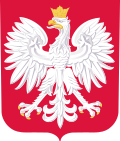| Poland Ambassador to Belarus | |
|---|---|
| Ambasador Rzeczypospolitej Polskiej na Białorusi | |
 | |
Incumbent since 2024Krzysztof Ożanna (chargé d’affaires) | |
| Reports to | Polish Ministry of Foreign Affairs |
| Seat | Minsk, Belarus |
| Appointer | President of Poland |
| Term length | No fixed term |
| Website | Embassy of Poland, Belarus |
The Republic of Poland Ambassador to Belarus is the official representative of the President and Government of Poland to the head of state of Belarus.